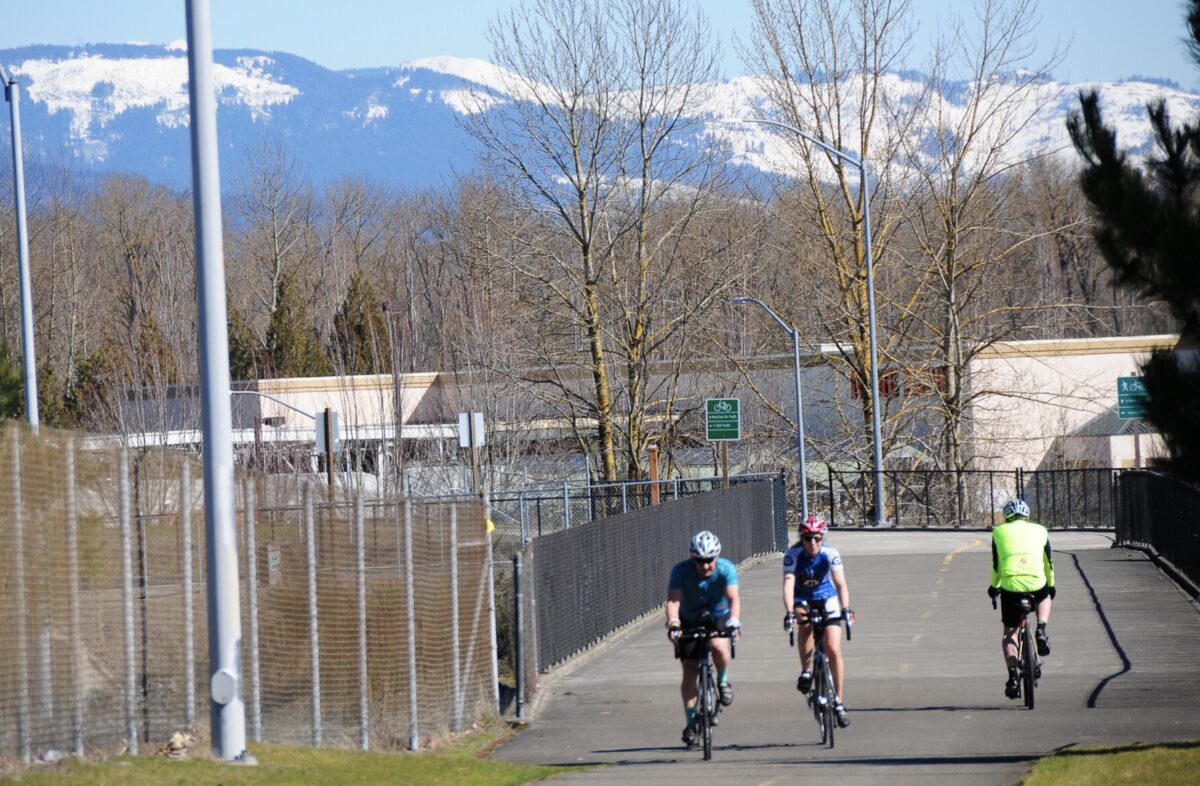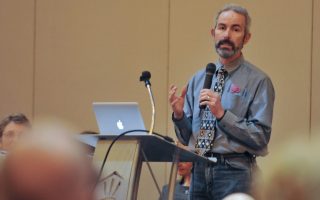
(Photo: Jonathan Maus/BikePortland)
Eugene-area Senator Floyd Prozanski will play a big role in whether or not a major effort to boost bicycle spending in Oregon will get the green light.

(Photo: Jonathan Maus/BikePortland)
While not a member of the Joint Transportation Committee, Prozanski is the lead sponsor of Senate Bill 395 which seeks to increase spending on biking and walking in the “Bike Bill” law from a 1% minimum to a 5% minimum of the State Highway Fund.
A bike rider himself, Prozanski has a long record of bike-related legislation. He spearheaded Oregon’s safe passing law in 2007 and Oregon’s “Idaho Stop” law in 2019.
In a phone interview last week, Sen. Prozanski tamped down expectations about the chances of SB 395 passing this session.
Advertisement
“I’d say it’s a bigger hurdle right now than maybe in other years.”
— Floyd Prozanski, Oregon Senator
A day before prior to our conversation, Prozanski hosted a strategy session with bike advocates from Eugene, Bend and Portland. I asked him about that meeting. “My takeaway is that we have a group that are willing to put the effort and time into trying to advance the cause, which is very important,” he said. According to sources, that group includes advocates from Bend, Eugene and Portland.
That statewide push will be vital to passing this bill. If legislators think this is just another “Portland thing” it won’t go anywhere.
SB 395 already has odds stacked against it because it’s centered around bikes (even though the vast majority of ODOT’s “Bike Bill” spending goes to sidewalks and other walking-related projects, a topic for another day) and it will require a shift in how money is spent — both topics fraught with peril in a session with many other major priorities during a time when the state is reeling from Covid-related budget woes.
Just how big a hurdle is a bill that makes a financial ask for bikes? “It’s a big thing,” Prozanski said. “I’d say it’s a bigger hurdle right now than maybe in other years, because right now, the state isn’t flush.” He then pointed out that Oregon’s financial picture might get a lot rosier when/if cannabis is fully legalized by the federal government, a move Prozanski thinks will lead to, “Hundreds upon hundreds of millions of dollars coming into our state.”
Tough odds won’t stop Prozanski or transportation reform advocates from working this bill. Bike-related legislation is always tricky and risks being misunderstood and marginalized, so there’s seems to be an “If not now, when?” attitude around SB 395. “I don’t know how you would say when is the right time to bring this forward,” is how Prozanski framed it.
Part of his plan will be to convince colleagues more money is needed so bike infrastructure can reach more people. “This is about how we make biking more accommodating for those who currently do it, how do we engage new ridership, and how do we ensure you know, an equity type of lens to ensure that some individuals who have not had these opportunities see that all are welcome into the bicycle world.”
Advertisement
A veteran of Cycle Oregon, Prozanski also talked about the importance of cycling’s impact on tourism and getting more rural legislators to see the potential for economic impacts that can come with bicycle infrastructure. Singling out the mountain bike trail riding mecca of Oakridge, Prozanski said, “This is about building infrastructure for something that isn’t just fun, it can be an economic driver.”
I then asked the Senator how he’d win over a fellow lawmaker if he was asked about it by a fellow lawmaker.
First, he’d say it’s long overdue. Prozanski said data could help make the case that the 1% minimum was set into law 50 years ago and has not kept pace with the growth of bicycling in Oregon: “How many years has it been that we have not taken up this issue and accommodated a higher percentage? I think it’s very easy to show in numbers. The data reflects the increase use of bicycling for recreation, for transportation for commuting for and in some areas even using bicycles for delivery services.”
Lack of safety would be another point to make. He made several references to the need to create physical separation for bike riders and create new paths and corridors that connect existing bikeways to new ones.
Prozanski knows the stakes of an incomplete bikeway network in a time when roads are so unsafe and our climate goals feel so out of reach. He’s clearly in favor of the bill, but when asked if he thinks it will pass, he tempered expectations. “I think the reality comes down to dollars and cents and what we can — or can’t — accomplish this time… Even even though this may not be the right time to actually get this through, it is an opportunity to educate and demonstrate why it is important.” He hopes to “pierce the thought process” of legislators who would never consider raising the Bike Bill spending minimum unless it was shoved in front of them for consideration.
Would he accept a compromise to get the bill passed?
“If we can get three [percent, instead of five], I’d say yeah, let’s take three. I mean, it’s better than one.”
So far there’s been no movement on SB 395 and it currently awaits a hearing in the Transportation Committee. Stay tuned for updates.
— Jonathan Maus: (503) 706-8804, @jonathan_maus on Twitter and jonathan@bikeportland.org
— Get our headlines delivered to your inbox.
— Support this independent community media outlet with a one-time contribution or monthly subscription.


